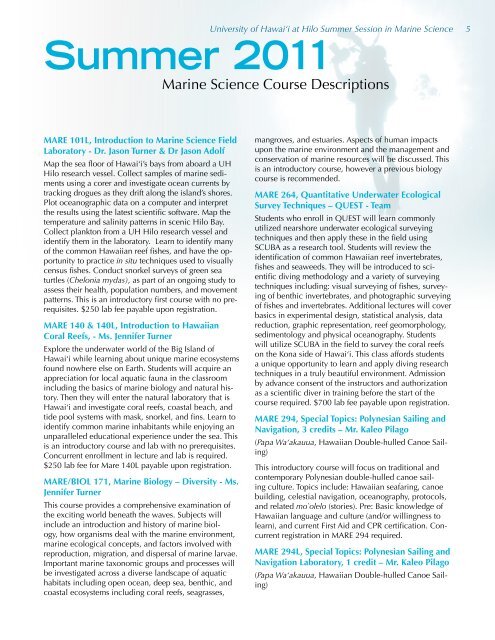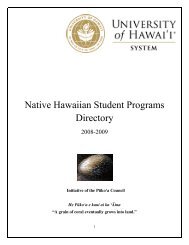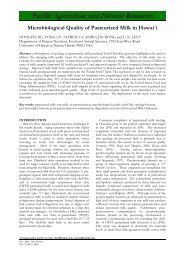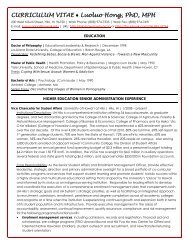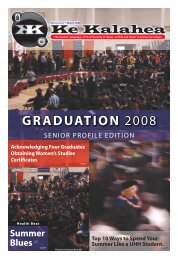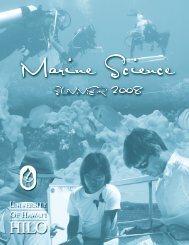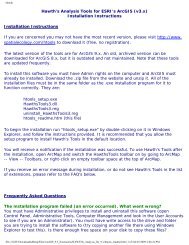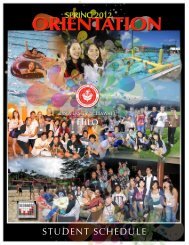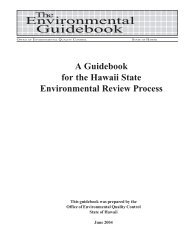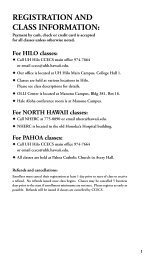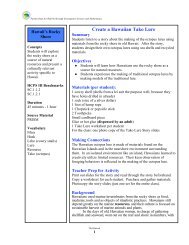Summer 2011 - University of Hawaii at Hilo
Summer 2011 - University of Hawaii at Hilo
Summer 2011 - University of Hawaii at Hilo
You also want an ePaper? Increase the reach of your titles
YUMPU automatically turns print PDFs into web optimized ePapers that Google loves.
<strong>University</strong> <strong>of</strong> Hawai‘i <strong>at</strong> <strong>Hilo</strong> <strong>Summer</strong> Session in Marine Science 5<br />
<strong>Summer</strong> <strong>2011</strong><br />
Marine Science Course Descriptions<br />
MARE 101L, Introduction to Marine Science Field<br />
Labor<strong>at</strong>ory - Dr. Jason Turner & Dr Jason Adolf<br />
Map the sea floor <strong>of</strong> Hawai‘i’s bays from aboard a UH<br />
<strong>Hilo</strong> research vessel. Collect samples <strong>of</strong> marine sediments<br />
using a corer and investig<strong>at</strong>e ocean currents by<br />
tracking drogues as they drift along the island’s shores.<br />
Plot oceanographic d<strong>at</strong>a on a computer and interpret<br />
the results using the l<strong>at</strong>est scientific s<strong>of</strong>tware. Map the<br />
temper<strong>at</strong>ure and salinity p<strong>at</strong>terns in scenic <strong>Hilo</strong> Bay.<br />
Collect plankton from a UH <strong>Hilo</strong> research vessel and<br />
identify them in the labor<strong>at</strong>ory. Learn to identify many<br />
<strong>of</strong> the common <strong>Hawaii</strong>an reef fishes, and have the opportunity<br />
to practice in situ techniques used to visually<br />
census fishes. Conduct snorkel surveys <strong>of</strong> green sea<br />
turtles (Chelonia mydas), as part <strong>of</strong> an ongoing study to<br />
assess their health, popul<strong>at</strong>ion numbers, and movement<br />
p<strong>at</strong>terns. This is an introductory first course with no prerequisites.<br />
$250 lab fee payable upon registr<strong>at</strong>ion.<br />
MARE 140 & 140L, Introduction to <strong>Hawaii</strong>an<br />
Coral Reefs, - Ms. Jennifer Turner<br />
Explore the underw<strong>at</strong>er world <strong>of</strong> the Big Island <strong>of</strong><br />
Hawai‘i while learning about unique marine ecosystems<br />
found nowhere else on Earth. Students will acquire an<br />
appreci<strong>at</strong>ion for local aqu<strong>at</strong>ic fauna in the classroom<br />
including the basics <strong>of</strong> marine biology and n<strong>at</strong>ural history.<br />
Then they will enter the n<strong>at</strong>ural labor<strong>at</strong>ory th<strong>at</strong> is<br />
Hawai‘i and investig<strong>at</strong>e coral reefs, coastal beach, and<br />
tide pool systems with mask, snorkel, and fins. Learn to<br />
identify common marine inhabitants while enjoying an<br />
unparalleled educ<strong>at</strong>ional experience under the sea. This<br />
is an introductory course and lab with no prerequisites.<br />
Concurrent enrollment in lecture and lab is required.<br />
$250 lab fee for Mare 140L payable upon registr<strong>at</strong>ion.<br />
MARE/BIOL 171, Marine Biology – Diversity - Ms.<br />
Jennifer Turner<br />
This course provides a comprehensive examin<strong>at</strong>ion <strong>of</strong><br />
the exciting world bene<strong>at</strong>h the waves. Subjects will<br />
include an introduction and history <strong>of</strong> marine biology,<br />
how organisms deal with the marine environment,<br />
marine ecological concepts, and factors involved with<br />
reproduction, migr<strong>at</strong>ion, and dispersal <strong>of</strong> marine larvae.<br />
Important marine taxonomic groups and processes will<br />
be investig<strong>at</strong>ed across a diverse landscape <strong>of</strong> aqu<strong>at</strong>ic<br />
habit<strong>at</strong>s including open ocean, deep sea, benthic, and<br />
coastal ecosystems including coral reefs, seagrasses,<br />
mangroves, and estuaries. Aspects <strong>of</strong> human impacts<br />
upon the marine environment and the management and<br />
conserv<strong>at</strong>ion <strong>of</strong> marine resources will be discussed. This<br />
is an introductory course, however a previous biology<br />
course is recommended.<br />
MARE 264, Quantit<strong>at</strong>ive Underw<strong>at</strong>er Ecological<br />
Survey Techniques – QUEST - Team<br />
Students who enroll in QUEST will learn commonly<br />
utilized nearshore underw<strong>at</strong>er ecological surveying<br />
techniques and then apply these in the field using<br />
SCUBA as a research tool. Students will review the<br />
identific<strong>at</strong>ion <strong>of</strong> common <strong>Hawaii</strong>an reef invertebr<strong>at</strong>es,<br />
fishes and seaweeds. They will be introduced to scientific<br />
diving methodology and a variety <strong>of</strong> surveying<br />
techniques including: visual surveying <strong>of</strong> fishes, surveying<br />
<strong>of</strong> benthic invertebr<strong>at</strong>es, and photographic surveying<br />
<strong>of</strong> fishes and invertebr<strong>at</strong>es. Additional lectures will cover<br />
basics in experimental design, st<strong>at</strong>istical analysis, d<strong>at</strong>a<br />
reduction, graphic represent<strong>at</strong>ion, reef geomorphology,<br />
sedimentology and physical oceanography. Students<br />
will utilize SCUBA in the field to survey the coral reefs<br />
on the Kona side <strong>of</strong> Hawai‘i. This class affords students<br />
a unique opportunity to learn and apply diving research<br />
techniques in a truly beautiful environment. Admission<br />
by advance consent <strong>of</strong> the instructors and authoriz<strong>at</strong>ion<br />
as a scientific diver in training before the start <strong>of</strong> the<br />
course required. $700 lab fee payable upon registr<strong>at</strong>ion.<br />
MARE 294, Special Topics: Polynesian Sailing and<br />
Navig<strong>at</strong>ion, 3 credits – Mr. Kaleo Pilago<br />
(Papa Wa‘akauua, <strong>Hawaii</strong>an Double-hulled Canoe Sailing)<br />
This introductory course will focus on traditional and<br />
contemporary Polynesian double-hulled canoe sailing<br />
culture. Topics include: <strong>Hawaii</strong>an seafaring, canoe<br />
building, celestial navig<strong>at</strong>ion, oceanography, protocols,<br />
and rel<strong>at</strong>ed mo`olelo (stories). Pre: Basic knowledge <strong>of</strong><br />
<strong>Hawaii</strong>an language and culture (and/or willingness to<br />
learn), and current First Aid and CPR certific<strong>at</strong>ion. Concurrent<br />
registr<strong>at</strong>ion in MARE 294 required.<br />
MARE 294L, Special Topics: Polynesian Sailing and<br />
Navig<strong>at</strong>ion Labor<strong>at</strong>ory, 1 credit – Mr. Kaleo Pilago<br />
(Papa Wa‘akauua, <strong>Hawaii</strong>an Double-hulled Canoe Sailing)


